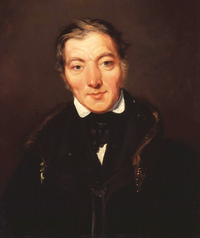William Henry Brooke

William Henry Brooke (1772–1860) was a British artist and illustrator.
Life[]
He was the son of the painter Henry Brooke and a nephew of Henry Brooke, the author of A Fool of Quality. He was a pupil of Samuel Drummond, and worked as a portrait painter.[1][2]

He exhibited portraits and figure subjects at the Royal Academy occasionally between 1810 and 1826, but is best known by his illustrations to books. He died at Chichester in 1860.
Works[]
As an illustrator, Brooke was influenced by Thomas Stothard, a friend.[1] He contributed to Thomas Moore's Irish Melodies, Izaak Walton's Compleat Angler in the edition by John Major, Thomas Keightley's Mythology, and other works.[2]
References[]
- ^ Jump up to: a b H. L. Mallalieu (1986). The Dictionary of British Watercolour Artists up to 1920. Antique Collectors' Club. p. 54. ISBN 1-85149-025-6.
- ^ Jump up to: a b Stephen, Leslie, ed. (1886). . Dictionary of National Biography. 6. London: Smith, Elder & Co.
- Other sources
 This article incorporates text from a publication now in the public domain: Bryan, Michael (1886). "Brooke, William Henry". In Graves, Robert Edmund (ed.). Bryan's Dictionary of Painters and Engravers (A–K). I (3rd ed.). London: George Bell & Sons.
This article incorporates text from a publication now in the public domain: Bryan, Michael (1886). "Brooke, William Henry". In Graves, Robert Edmund (ed.). Bryan's Dictionary of Painters and Engravers (A–K). I (3rd ed.). London: George Bell & Sons.
External links[]
- William Henry Brooke at Library of Congress Authorities, with 3 catalogue records
Categories:
- 1772 births
- 1860 deaths
- 19th-century Irish painters
- Irish male painters
- Irish illustrators
- Irish painter stubs
